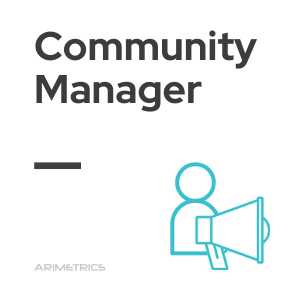
Definition:
A community manager creates, grows and manages online communities, usually on social media,often around a brand or cause. Among other functions, they have to create, analyze, understand and direct the information that is produced in social networks, monitor actions and create digital communication strategies.
Origin of the term Community Manager
The origins of the term community manager can be traced back to the video game industry with the advent of MMORPGs (Massively Multiplayer Online Role-playing Games) in 1995. His duties have expanded to include a wide variety of functions and skill sets including social media management, marketing, public relations, and customer support. At its core, the community manager encompasses a bit of each of them, while retaining its basic principle – ensuring open communication between the developer and the community.
While the term“community manager” was not used at the time, the role has also existed since online systems began to offer functions and features that enabled the creation of communities. These early efforts, in the form of bulletin systems, had leaders known as network managers or Sysops.
The 1990s led to the growth of online computer services such as Prodigy, CompuServe, and America Online. Prominent features of these services include communities that went through various names; Special Interest Groups, Communities of Interest and so on. And their leaders are often referred to as community managers.
Functions of a community manager
Community managers can perform various tasks, depending on the nature and purpose of their online community, which may or may not be part of a company. They are involved in the video game industry, branding online communities, research communities, corporate blogs and other social media marketing and research activities.
It plays a new role in marketing, Internet advertising and documentation, as it is an established profession. Her roles have expanded to include a wide variety of functions and skill sets, including social media management, marketing, public relations and customer support.
In 2010 it was established as Community Manager Day on the fourth Monday of January, where users are asked to send thank you notes to their community managers.
Key skills of a community manager
To be effective, a community manager must possess a number of key skills:
- Communication: Must be able to communicate clearly and effectively, both written and verbally, to interact with the community and represent the voice of the brand.
- Data analysis: It is essential that you can interpret social media metrics and data to adjust strategies and improve performance.
- Creativity: The ability to generate attractive and relevant content is essential to maintain the interest of the community.
Future trends in community management
The role of the community manager continues to evolve with the digital landscape:
- Automation: The use of automated tools for community management is on the rise, allowing community managers to focus on more strategic tasks.
- Focus on authenticity: As consumers seek more authentic interactions, community managers should focus on creating authentic connections with their audience.
- Integration of new technologies: Augmented reality and immersive experiences are beginning to play a role in how brands interact with their communities.
Tools most used by community managers
To effectively manage online communities, community managers use a variety of tools that facilitate their daily work. Here are ten of the most popular ones:
- Hootsuite: Allows you to schedule and manage posts on multiple social networks from a single dashboard, saving time and ensuring a constant online presence.
- Buffer: Offers functionalities to schedule publications and analyze their performance, providing valuable data on engagement and reach.
- Sprout Social: Provides detailed analytics, social network management and monitoring functions, helping to better understand the audience and adjust strategies.
- Canva: An essential tool for creating engaging visual content. Offers easy-to-use templates and design tools for creating professional images and graphics.
- Google Analytics: Although not specific to social media, it is crucial for understanding how social media traffic impacts a brand’s website, helping to measure return on investment.
- Mention: Allows monitoring brand mentions in social networks and on the web, helping community managers to be aware of what is being said about their brand.
- Trello: Used for project and task management, Trello helps community managers organize their daily activities and collaborate with other team members.
- SocialBee: Offers tools for scheduling content, managing multiple accounts and analyzing performance, with a focus on automating repetitive tasks.
- BuzzSumo: Helps identify trends and popular topics, allowing community managers to create relevant and timely content that resonates with their audience.
- Metricool: A social media management platform that provides tools for planning, creating and publishing content, as well as offering analytics to measure the success of campaigns.
